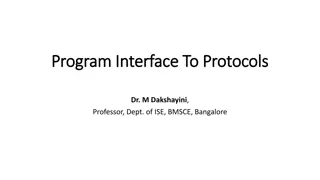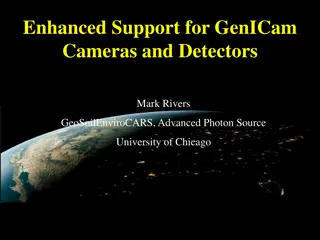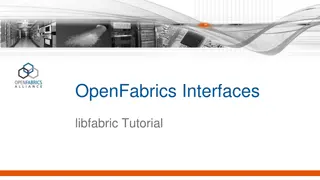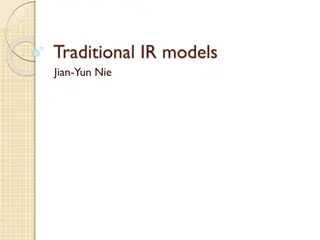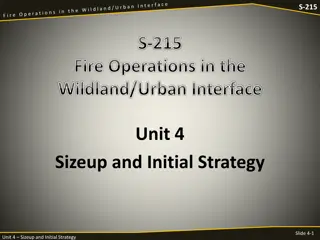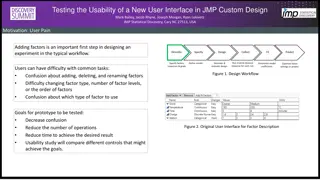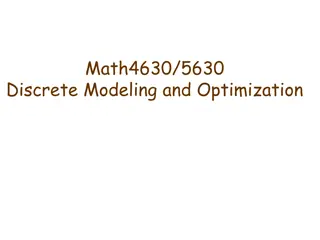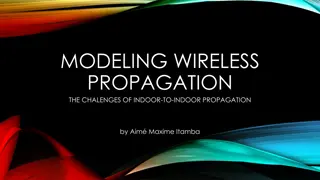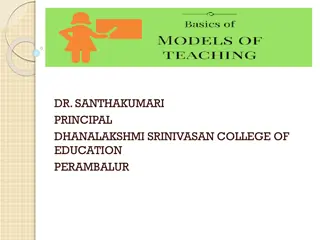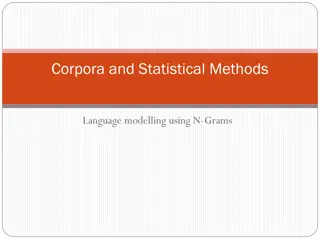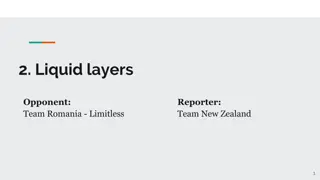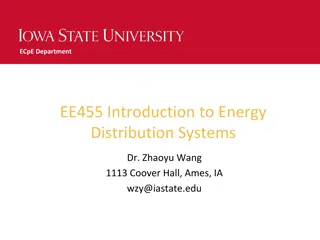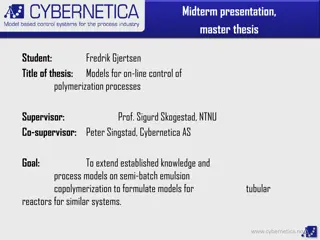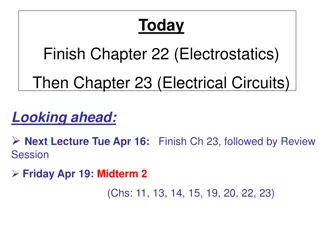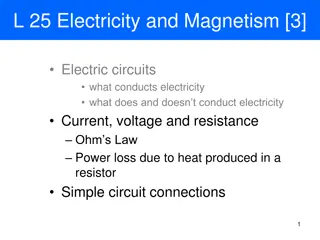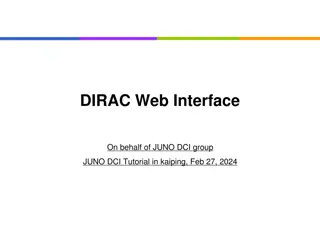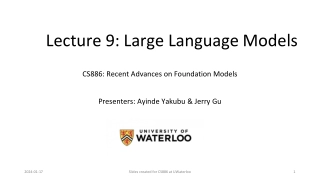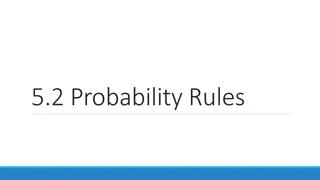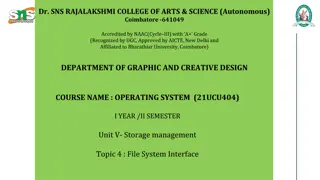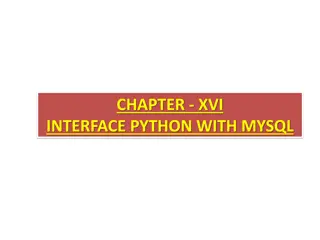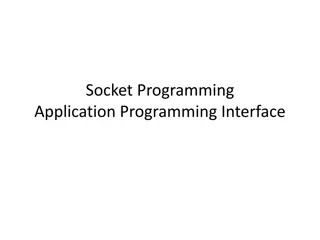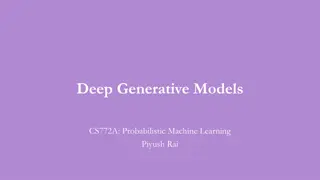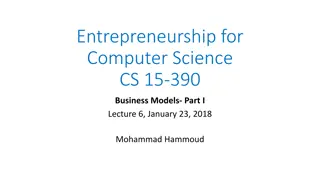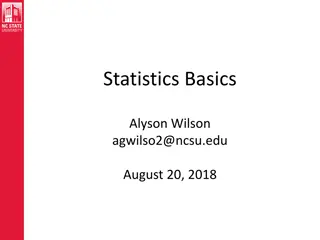Understanding the Interface to the Current CCPP: A Simple Model's Perspective
This content explores the interface to the current CCPP from a simple model's viewpoint, focusing on two simplistic schemes - kinetics and chem_solve. It delves into how the MusicBox simple driver model adapts chemical species using temperature and rate constants. Users can control the run sequence and schemes, modifying their order and incorporating compliant routines. The Kinetics source code for the subroutine kinetic_run is also detailed, along with the Argument Table for kinetic_run. Additionally, Kinetics Metadata and the linkage of data throughout the model are discussed.
Download Presentation

Please find below an Image/Link to download the presentation.
The content on the website is provided AS IS for your information and personal use only. It may not be sold, licensed, or shared on other websites without obtaining consent from the author. Download presentation by click this link. If you encounter any issues during the download, it is possible that the publisher has removed the file from their server.
E N D
Presentation Transcript
Interface to the current CCPP: Interface to the current CCPP: A simple model s perspective A simple model s perspective Cheryl Craig
Simple Model Suite characteristics Simple Model Suite characteristics Two simplistic schemes: kinetics, chem_solve Kinetics: sets k_rateConst variable Chem_solve: Uses temperature from the host model and k_rateConst from the kinetics scheme to adjust chemical species MusicBox simple driver model (host) for MICM musicbox_var_defs.f90 file which contains the variables used in the CCPP interfaces for the host model MusicBox (host for MICM) CPF interface (CCPP currently) chem_solve kinetics
Simple model Suite Simple model Suite <?xml version="1.0" encoding="UTF-8"?> <suite name= MusicBox_two_scheme_test" lib="micmchem" ver="1.0.0"> <group name="time_vary"> <subcycle loop="1"> <scheme>kinetic</scheme> <scheme>chem_solve</scheme> </subcycle> </group> <finalize>kinetic</finalize> <finalize>chem_solve</finalize> </suite> How user controls the run sequence and the schemes used User may: Modify the order of the schemes Replace or add their own CCPP- compliant routine Can also: Subcycle Have additional groups
Kinetics source code Kinetics source code subroutine kinetic_run (T, k_rateConst, errmsg, errflg) !--- arguments real(kind_phys), real(kind_phys),pointer, intent(inout) :: k_rateConst(:) character(len=512), intent(out) integer, intent(out) real(kind_phys) :: t_inverse t_inverse = 1_kind_phys/T intent(in) :: T ! Temperature :: errmsg :: errflg Is a normal Fortran subroutine, except: No file I/O Must return errors (no internal stop) Currently three routines XXX_init, XXX_run, XXX_finalize All information external to the scheme comes through the parameter list (no use statements from outside scheme) k_rateConst(1) = 0.04_kind_phys k_rateConst(2) = 1e+4_kind_phys k_rateConst(3) = 1.5e7_kind_phys & * exp(0 * t_inverse)
Kinetics Metadata (format will be changing) Kinetics Metadata (format will be changing) !> \section arg_table_kinetic_run Argument Table !! |local_name |standard_names !! |------------|------------------|----------------------|-------|------ !! | T | air_temperature | Temperature !! | k_rateConst| k_rate_constants | k Rate Constants !! | errmsg | error_message | CCPP error message !! | errflg | error_flag | CCPP error flag !! Local name: Your variable name in routine Standard name: Name throughout program (will be a clearing house of names CF names where defined) THIS IS WHAT LINKS THE DATA THROUGHOUT THE MODEL Units Checks units are consistent between schemes | long_name |units | rank | K | none | | none | | flag | | 0 1 0 0 | type |-----------|-----------|--------|-----| | real | kind_phys | in | real | kind_phys | inout | F | kind | intent | opt | | F | | | character | len=512 | out | F | | integer | | out | F |
Main driver ( Main driver (MusicBox #include ccpp_modules.inc ! Initialize vars state_host%Temperature = 200. MusicBox) ) -- -- Part 1 Part 1 ccpp_init uses the Suite Definition file to setup the schemes and the order they ll be called ccpp_physics_init calls the schemes specified in the Suite Definition File do i = 1, ncols ! Use the suite information to setup the run call ccpp_init( '../suites/suite_MusicBox_test_simple1.xml', cdata(i),& ierr) if (ierr/=0) write error and stop < --- The #include lines will be discussed in later slide #include "ccpp_fields.inc" ! initialize each column's physics based on suite information call ccpp_physics_init(cdata(i), ierr=ierr) if (ierr/=0) write error and stop end do
Main driver ( Main driver (MusicBox ! loop over all time steps do j = 1, ntimes do i = 1, ncols call ccpp_physics_run (cdata(i), & ierr=ierr) if (ierr/=0) write error and stop end do end do MusicBox) ) -- -- Part 2 Part 2 Iterate over ntimes, calling ccpp_physics_run (which calls the schemes from the Suite Definition File ccpp_finalize at the end of the run NOTE We never explicitly called kinetics or chem_solve. Easy to swap/reorder calls using the Suite Definition File do i=1, ncols call ccpp_finalize (cdata(i), ierr) if (ierr/=0) write error and stop end do
musicbox_var_defs musicbox_var_defs file file define define vars vars for the host model for the host model !> \section arg_table_MusicBox_vardefs !! | local_name !! |------------------------|-----------------------------|---------- !! | state_host%Temperature | air_temperature !! | errmsg | error_message !! | errflg | error_flag !! | k_rateConst | k_rate_constants !! type my_state real(kind_phys) :: Temperature end type my_state type(my_state), target :: state_host character(len=512) :: errmsg integer :: errflg real, pointer :: k_rateConst(:) | standard_name | | ( + rest of | descriptors) | | The host model does not have declarations for these fields (they are declared here first #include) The 2nd #include earlier brings in ccpp_field_add calls for every variable Standard_name is the linkage between pieces of the model (i.e. temperature in host is in state_host%Temperature and is T in kinetics scheme)
Questions? Contact info: cacraig@ucar.edu






